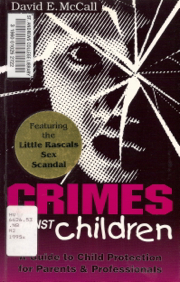Rascals case in brief
In the beginning, in 1989, more than 90 children at the Little Rascals Day Care Center in Edenton, North Carolina, accused a total of 20 adults with 429 instances of sexual abuse over a three-year period. It may have all begun with one parent’s complaint about punishment given her child.
Among the alleged perpetrators: the sheriff and mayor. But prosecutors would charge only Robin Byrum, Darlene Harris, Elizabeth “Betsy” Kelly, Robert “Bob” Kelly, Willard Scott Privott, Shelley Stone and Dawn Wilson – the Edenton 7.
Along with sodomy and beatings, allegations included a baby killed with a handgun, a child being hung upside down from a tree and being set on fire and countless other fantastic incidents involving spaceships, hot air balloons, pirate ships and trained sharks.
By the time prosecutors dropped the last charges in 1997, Little Rascals had become North Carolina’s longest and most costly criminal trial. Prosecutors kept defendants jailed in hopes at least one would turn against their supposed co-conspirators. Remarkably, none did. Another shameful record: Five defendants had to wait longer to face their accusers in court than anyone else in North Carolina history.
Between 1991 and 1997, Ofra Bikel produced three extraordinary episodes on the Little Rascals case for the PBS series “Frontline.” Although “Innocence Lost” did not deter prosecutors, it exposed their tactics and fostered nationwide skepticism and dismay.
With each passing year, the absurdity of the Little Rascals charges has become more obvious. But no admission of error has ever come from prosecutors, police, interviewers or parents. This site is devoted to the issues raised by this case.
On Facebook
Click for earlier Facebook posts archived on this site
Click to go to
Today’s random selection from the Little Rascals Day Care archives….
Click for earlier Facebook posts archived on this site
Click to go to
Today’s random selection from the Little Rascals Day Care archives….
Investigator still believes Kelly was guilty
 May 13, 2013
May 13, 2013
“On January 20, (1989, Audrey) Stever met with (social workers) David McCall and Grenda Costin, who told Ms. Stever that there was going to be an investigation into the day care. They also suggested to Ms. Stever that they put Kyle in therapy (and) that ‘they thought something was going on’ at the day care.
“On January 21, (Brenda) Toppin, Ms. Costin and Mr. McCall came to interview Kyle at his home. Ms. Stever prepared Kyle by telling him that he needed to be a ‘police helper’ to help figure out why the children at the day care were sad.”
– From brief for Bob Kelly before N.C. Court of Appeals (1994)
“As an initial social services investigator in the Robert Kelly case, I believe justice was served with this verdict…. A Salem-style witch-hunt did not occur, and a perpetrator of crimes against children was justly convicted. A significant battle in the war against child sexual abuse was fought and won in Edenton….”
–From “Crimes Against Children: A Guide to Child Protection for Parents and Professionals featuring the Little Rascals Day Care Sex Scandal” by David E. McCall (1995)
I asked McCall if he still believes justice was served in Little Rascals. “I stand on my original substantiation of abuse by Robert Kelly,” he said. “I was not involved in the investigation of the others charged.”
He said he went into the case with “significant training” in investigating abuse, adding that “If you ever want a child interviewed to find the truth, I really feel like I’m pretty good at that.”
McCall later left social work and now sells real estate in Edenton.
Can Edenton squeeze in one more historical marker?
 Nov. 27, 2014
Nov. 27, 2014
“Of the dozen or so historical markers clustered in the town of Edenton, only one – recognizing novelist Inglis Fletcher – postdates the 1800s.
“The North Carolina Highway Historical Marker Committee now has the opportunity, 25 years after the first arrest in the Little Rascals case, to add to that number a 20th Century event inarguably significant in the legal and social history of not just North Carolina but also the nation.”
– From my application proposing “history on a stick” recognition for the Little Rascals Day Care case
The marker committee, composed of historians from four-year colleges across the state, will meet in December to decide which pending applications meet its criteria.
‘Black helicopters’ over Edenton? Sure, why not?
Feb. 27, 2015
“…. A social worker from North Carolina informed the group (the Society for the Investigation, Treatment and Prevention of Ritual and Cult Abuse) that in the day-care sex-abuse case she was investigating, she thought she remembered the kids talking about black helicopters. She said she would look into it.”
– From “Conspiracy Theories and Paranoia: Notes from a Mind-Control Conference” by Evan Harrington in the Skeptical Inquirer (September-October 1996)
The “ritual and cult abuse” conference took place in Dallas in March 1995, several years after the trials of Bob Kelly and Dawn Wilson (and just a couple of months before the North Carolina Court of Appeals overturned their convictions). But I wouldn’t be surprised if the social worker chatting with Dr. Harrington was a prosecution therapist still eagerly accumulating and broadcasting claims … this one perhaps.
Nancy Lamb takes up career in ‘quality control’
 Feb. 27, 2012
Feb. 27, 2012
“One (change made by District Attorney Frank Parrish) was the assignment of Assistant District Attorney Nancy Lamb as ‘Chief Assistant District Attorney,’ making one of her duties ‘quality control’ and noting she will only continue to ‘try cases as necessary.’ ”
– From the Outer Banks Voice (Feb. 14, 2012)
“Quality control”? That’s hardly a gift that evinced itself in Lamb’s frenzied, hysterical prosecution of the Edenton Seven.
But her removal from the courtroom should be reassuring to innocent defendants throughout the First Judicial District.











0 CommentsComment on Facebook